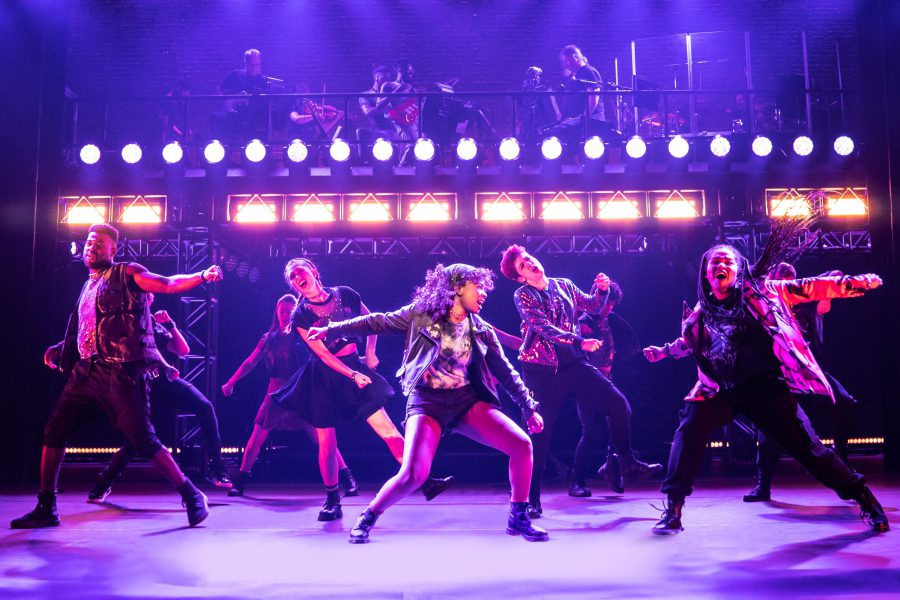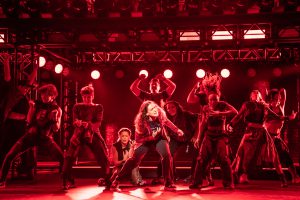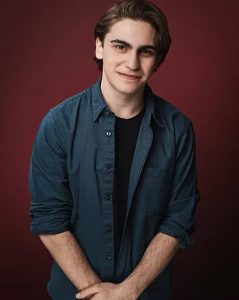Alanis Morissette’s music reaches new generation in ‘Jagged Little Pill’ at BroadwaySF

Lauren Chanel and the North American Touring Company of “Jagged Little Pill.” Photo by Matthew Murphy for MurphyMade.
Dillon Klena wasn’t even born when Alanis Morissette’s Jagged Little Pill hit No. 1 on the Billboard 200 in 1995. But now he’s part of a new generation of young performers bringing Morissette’s music to life on stage for the album’s second act. While the pandemic shuttered the show on Broadway, the national tour is off and running, and Klena couldn’t be more excited.
“Jagged Little Pill”
Oct. 11 through Nov. 6
Golden Gate Theatre, 1 Taylor St., San Francisco
Tickets: $66.50-$147.50. Recommended for ages 14 and up. No children under 5 allowed.
Morissette’s sophomore album lent a novel feminist voice to the societal issues and internal struggles facing millions of second-wave Gen Xers. The successful stage musical continues to shine a light on issues of the current day with openness, maturity and nuance.
The show’s Broadway run garnered 15 Tony nominations, second only to “Hamilton” in Tony Awards history. With a book by Oscar winner Diablo Cody (“Juno,” “Young Adult”), the stage adaptation weaves Morissette’s music through the story of a picture-perfect Connecticut family as it confronts issues of gender and sexual identity, opioid addiction and sexual assault trauma.
As many of the show’s characters are in high school, the cast comprises a host of young millennials and Zoomers. So how do these anthems of Generation X resonate with younger ears? And perhaps more importantly, how do music and lyrics from a quarter-century ago manage to tackle such decisively 21st-century social issues?
“I remember listening to the songs in the car when I was younger, very vividly,” Klena said. “I always knew ‘Ironic,’ ‘You Oughta Know’ and ‘Hand in My Pocket.’ … Those three are the ones my generation knows the most.”
The stage musical features all 12 songs from the album, as well other Morissette hits, like “Thank U,” “Uninvited” and “That I Would Be Good.” Morissette also wrote two new songs for the stage production.
There are some humorous references to the songs’ anachronistic placement. When one character sings about giving a peace sign, another remarks, “A peace sign? What year is this?” In another scene, a teen girl reads one of her poems in English class (“Ironic”) while others are quick to point out that nothing in the poem is ironic, mirroring a frequent talking point among fans over the years.
But Klena believes that Morissette’s songs have staying power. For him, her music still captures the zeitgeist of his generation. He suggests that the issues faced by different generations may vary in the details, but that some elements of the internal human struggle are ubiquitous.
“All the songs—even though they’re 25 years old; I don’t feel like they’re ever going to go away,” Klena says. “Good music never goes away.”
Klena graduated from Cal State, Fullerton in 2020 in the midst of COVID. It wasn’t an ideal time for the former musical theater major to start a career. He says he’s still learning much about himself, how to be a performer, and how to navigate the industry. “Jagged Little Pill” marks his first show at this level.
The 23-year-old is happy to be spending the early part of his first tour in California, where he grew up. He remembers seeing his first show at the age of 2 at Los Angeles’ Pantages Theater. His mother took him to see “The Lion King,” but Klena insisted on mimicking the stage action with his stuffed animals on the back of the person seated in front of him.
Klena found it surreal to be performing in the same theater from where toddler-Dillon was ejected.
His energy and creativity paid off, landing him the role of Nick, the dutiful son of the Healy family at the center of “Jagged Little Pill.” Eighty people from his former children’s theater group attended opening night in Los Angele, wearing badges bearing the hashtag #JaggedLittleDill.
But Klena’s interest in the show preceded his casting. His brother Derek, seven years his elder, originated the role of Nick on Broadway, earning a Tony nomination for his performance. While they talk about the role, Klena had the freedom to bring his own perspective to the role.

Jade McLeod and the North American Touring Company of “Jagged Little Pill.” Photo by Matthew Murphy for MurphyMade.
“[Derek] gave me some advice on things, but he kind of just let me do my own thing with the character,” he says.
Still, the younger Klena credits his brother as a motivating force.
“He’s the best supporter and my inspiration,” he says. “His career is so fruitful and so full… [I’m] just seeing where this world has taken him and kind of using that as my guide.”
Klena says the age gap between he and his older brother allows him to bring a younger perspective to the role. Being much closer to high school age, Klena feels that the struggles of the teens in the show are a little closer to home for him.
Nick is the model son of the family, and a “peacemaker,” Klena says. In the opening scene, Nick’s family is celebrating his early acceptance to Harvard. While watching the crumbling marriage of his sexually frustrated father and opioid-addicted mother, Nick tries to remain the perfect son while his adopted younger sister, Frankie, is rebellious.
One of the highlights of the show for Klena is Nick’s solo, “Perfect,” in which he laments his need to fulfil this role for the family.
“I feel like Nick doesn’t have his own voice and he doesn’t know really who he is because he’s done everything to the book,” Klena says. “Because of that, he never had room to fail. When you fail, that’s when you grow. That’s when you learn most about who you are.”
Nick’s world changes when he witnesses the sexual assault of a classmate and doesn’t do anything to stop it. His personal struggle entails coming to terms with his failure to act. While Klena says he’s nothing like his character, he does see bits of himself in Nick. “Perfect” is one of those moments that resonates with him.
“People can find so many different parts of themselves in all the different characters,” Klena says. “It’s different for everyone. I feel like our show has pieces everyone can relate to. Everyone’s been through something in this show.”
Klena wants everyone to see this show. He thinks its Broadway run was cut too short.

Dillon Klena, courtesy.
“The content of the show is deep and so raw,” he says. “After the pandemic, after everything this country has been through, I feel like the show is finally ready to take that step—to be shown across the country. I’m happy to be a part of that.”
Another highlight of the show for Klena is “You Oughta Know,” sung by Jo, played by Jade McLeod, also in a national tour debut. Jo is Frankie’s genderqueer romantic partner, whose religious upbringing is a constant source of conflict.
With such a focus on social issues, one may think “Jagged Little Pill” risks catering to a limited audience and preaching to the choir. But Klena insists it’s for everyone.
“It’s about bringing people together instead of finding that divide,” he says. “I feel like that’s what our show is trying to bring about; connection and finding the function within the dysfunction of our country.”
Klena believes the show holds up an important mirror to society, which can be uncomfortable, but also engaging.
“The purpose of this show is to educate and to really break down what people struggle with, and what people go through, and really shed light on it.”
He says attendees may find issues that resonate them, feel inspired to act in some way, or learn something.
The show has had to do some learning of its own. The Broadway production faced criticism from members of the transgender and nonbinary communities for seemingly erasing Jo’s nonbinary identity from the story. Producers modified some scenes to clarify Jo’s story, amended casting guidelines and brought in diversity consultants to work with the company and creative team. McLeod is proudly nonbinary.
It’s fitting for a show that approaches such challenging topics to embrace opportunities for growth in order to live up to the mission.
“We’re all discovering things together, and learning together and growing together,” Klena says.
With such powerful subject matter, Klena values having a closely bonded cast for support. Other young cast members making their national tour debuts include Lauren Chanel as Frankie, Allison Sheppard as Bella (the victim of the assault that Nick witnesses) and Rishi Golani as Phoenix. Heidi Blickenstaff, who performed the role of Mary Jane (MJ) on Broadway, returns to lead the young cast. Broadway veteran Chris Hoch plays Steve, her husband.
Klena treasures the moments where the whole company is on stage, such as in the show’s finale, “You Learn.” The confluence of storylines, themes and issues as they resolve on stage together lends credence to the idea that our stories intertwine—that we’re all in this together and that we can learn from each other. Without giving anything away about the story, we know from Morissette’s lyrics that the song encourages us to embrace the difficult and to accept failure.
“It’s a rollercoaster of a show,” Klena says before enlisting the finale’s famous lyrics, “But I guarantee that when you leave, you will have lived, and you will have learned.”
